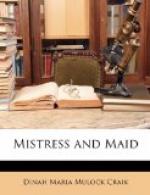It may be said a servant had no business to think about these things, to criticize her young master’s proceedings, or wonder why her mistresses were sad: that she had only to go about her work like an automaton, and take no interest in any thing. I can only answer to those who like such service, let them have it: and as they sow they will assuredly reap. But long after Elizabeth, young and hearty, was soundly snoring on her hard, cramped bed, Johanna and Hilary Leaf, after a brief mutual pretence of sleep, soon discovered by both, lay consulting together over ways and means. How could the family expenses, beginning with twenty-five shillings per week as rent, possibly be met by the only actual certain family income, their £50 per annum from a mortgage? For the Misses Leaf were or that old-fashioned stamp which believed that to reckon an income by mere probabilities is either insanity or dishonesty.
Common arithmetic soon proved that this £50 a year could not maintain them; in fact they must soon draw on the little sum—already dipped into to-day, for Ascott—which had been produced by the sale of the Stowbury furniture. That sale, they now found had been a mistake; and they half feared whether the whole change from Stowbury to London had not been a mistake—one of those sad errors in judgment which we all commit sometimes, and have to abide by, and make the best of, and learn from if we can. Happy those who “Dinna greet ower spilt milk”—a proverb wise as cheerful, which Hilary, knowing well who it came from, repeated to Johanna to comfort her—teaches a second brave lesson, how to avoid spilling the milk a second time. And then they consulted anxiously about what was to be done to earn money.
Teaching presented itself as the only resource. In those days women’s work and women’s rights had not been discussed so freely as at present. There was a strong feeling that the principal thing required was our duties—owed to ourselves, our home, our family and friends. There was a deep conviction—now, alas! slowly disappearing—that a woman, single or married, should never throw herself out of the safe circle of domestic life till the last extremity of necessity; that it is wiser to keep or help to keep a home, by learning how to expend its income, cook its dinners, make and mend its clothes, and, by the law that “prevention is better than cure,” studying all those preservative means of holding a family together—as women, and women alone, can—than to dash into men’s sphere of trades and professions, thereby, in most instances, fighting an unequal battle, and coming out of it maimed, broken, unsexed; turned into beings that are neither men nor women, with the faults and corresponding sufferings of both, and the compensations of neither.
“I don’t see,” said poor Hilary, “what I can do but teach. And oh, if I could only get daily pupils, so that I might come home or nights, and creep into the fireside; and have time to mend the stockings and look after Ascott’s linen, that he need not be so awfully extravagant.”




